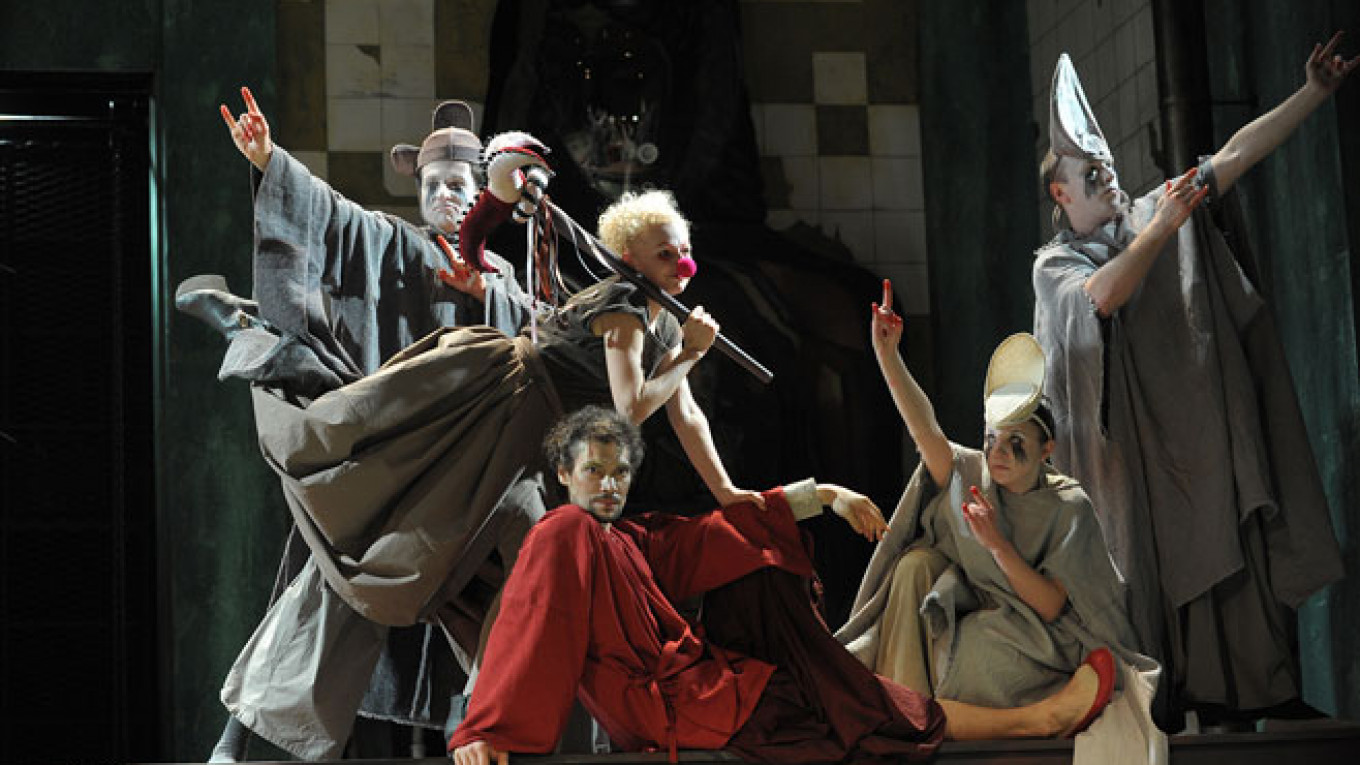The 2015-16 season of opera in Moscow enjoyed a rousing start last month when Novaya Opera Theater brought to its stage a new version of Richard Strauss' "Salome" that came as close to getting everything right — singing, conducting, orchestral playing and staging — as any local production of opera in post-Soviet times.
Still ahead at Moscow's five opera houses between now and next July are some 14 more major new productions that promise opera lovers a season of unusual diversity.
The Bolshoi Theater has five large-scale premieres on its agenda, beginning on Oct. 28 with Pyotr Tchaikovsky's very last opera, "Iolanta," and bringing with it the long-overdue Bolshoi debut of veteran conductor Vladimir Fedoseyev, who has long enjoyed great success leading opera abroad.
"Iolanta" was written simultaneously with the ballet "The Nutcracker," and the two works made their debut together at St. Petersburg's Mariinsky Theater in 1892. While many might welcome a new production of "The Nutcracker" to accompany "Iolanta," the Bolshoi has instead chosen to precede it with just a suite of music from the ballet's score.
On Dec. 13, the Bolshoi takes first plunge into opera of the baroque era as performed in approximately authentic fashion, a co-production with the English National Opera of George Frideric Handel's "Rodelinda."
For its third new production, slated to premier on premiere Feb. 18, the Bolshoi has chosen "Katerina Ismailova," the somewhat tamed revision that Dmitry Shostakovich made of his "Lady Macbeth of the Mtsensk District" in 1962, nearly three decades after the original version of the opera was banned from the Soviet stage. Directing "Katerina Ismailova" will be the Vakhtangov Theater's Rimas Tuminas. The conductor will be the Bolshoi's music director Tugan Sokhiev.
To stage its production of Gaetano Donizetti's tuneful comic opera "Don Pasquale" — premiering on April 19 — the Bolshoi has taken the bold and commendable step of inviting Timofei Kulyabin, whose radical staging of Richard Wagner's "Tannhauser" in Novosibirsk late last year caused a thoroughly unwarranted "scandal," provoked by the local head of the Russian Orthodox Church and compounded by dubious decisions on the part of the Russian Culture Ministry. "Don Pasquale," which concerns a rich old man outwitted in the pursuit of his capricious young ward, seems unlikely to give much scope for scandal.
Finally, the Bolshoi turns to French composer Hector Berlioz' "The Damnation of Faust," to premiere on July 22. This work is not really an opera in the traditional sense, but what Berlioz called a "dramatic legend." Filled with glorious music, but a difficult work to bring alive dramatically, its staging has been entrusted to the renowned German director Peter Stein, whose version of Giuseppe Verdi's "Aida" has graced the stage of the Stanislavsky and Nemirovich-Danchenko the past two seasons. Sokhiev is scheduled to conduct.
For this season, the Stanislavsky and Nemirovich-Danchenko Theater is planning two major new productions: French composer Jules Massenet's lovely opera "Manon," long absent from the Moscow repertoire, in a staging by another well-regarded operatic specialist, Latvian director Andrejs Zagars. This premieres on Jan. 29. The second production is Sergei Prokofiev's "The Love for Three Oranges," led by the consistently brilliant former chief conductor of the Bolshoi, Alexander Lazarev, and staged by the theater's artistic director of opera, Alexander Titel.
Novaya Opera follows its stunning "Salome" with a new production, much needed on the local stage, of Giacomo Puccini's "La Boheme." The opera, which premiers on Dec. 4, is directed by the experienced and often quite imaginative, Georgy Isaakyan, the head of Moscow's Sats Children's Musical Theater.
Next month, Helikon returns from an eight-year exile in drab and unsuitable premises on Novy Arbat to its original home on Bolshaya Nikitskaya. The late 19th-century mansion that houses the theater has been totally renovated, and a brand-new 500-seat theater constructed in its former courtyard.
After an opening series of gala concerts, beginning on Nov. 2, on Nov. 10 Helikon founder and artistic director Dmitry Bertman presents his first staging in the new theater, Nikolai Rimsky-Korsakov's "Sadko," an operatic epic of considerable length set in ancient Novgorod. Following soon after, on Dec. 23, will be a reconstruction of Konstantin Stanislavsky's legendary production of Tchaikovsky's "Eugene Onegin," which held the stage in Moscow for some eight decades following its debut in the early 1920s. On June 22, Ruggero Leoncavallo's ever-popular "I Pagliacci" will premiere.
As usual, the Pokrovsky Chamber Musical Theater and its venerable music director Gennady Rozhdestvensky are preparing to offer an array of fascinating operatic fare unavailable at Moscow's other opera houses. Nov. 4 sees the premiere of a recently devised chamber version of Czech composer Leos Janacek's charming fairy tale for adults, "The Cunning Little Vixen," to be followed in April by the least known of Rimsky-Korsakov's 15 operas, his "Servilia." Near the end of the season next summer the theater will premier an operatic treat that local audiences have far too long been denied, Richard Strauss' delightful "Ariadne auf Naxos."
A Message from The Moscow Times:
Dear readers,
We are facing unprecedented challenges. Russia's Prosecutor General's Office has designated The Moscow Times as an "undesirable" organization, criminalizing our work and putting our staff at risk of prosecution. This follows our earlier unjust labeling as a "foreign agent."
These actions are direct attempts to silence independent journalism in Russia. The authorities claim our work "discredits the decisions of the Russian leadership." We see things differently: we strive to provide accurate, unbiased reporting on Russia.
We, the journalists of The Moscow Times, refuse to be silenced. But to continue our work, we need your help.
Your support, no matter how small, makes a world of difference. If you can, please support us monthly starting from just $2. It's quick to set up, and every contribution makes a significant impact.
By supporting The Moscow Times, you're defending open, independent journalism in the face of repression. Thank you for standing with us.
Remind me later.






